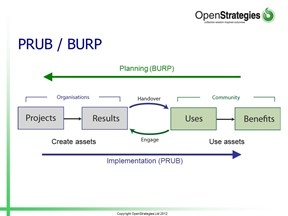Live Webinar – August 14th, 2014 7:30 am – 8:30 am EDT
Live Webinar – August 14th, 2014 12:30 PM – 1:30 PM BT
Duration: 1 hour webinar Credits: 1 PDU Category B – Free PDU
Sponsored by: Associaton for Project Management – APM
NOTE: Login or register to book onto this event. (Find the small print at the top of the age after you hit our “Click to register” link)
Most strategies (90%) have minimal or no impact. Why?
Because most so-called strategies:
- Aren’t actually strategies
- Cannot be understood by the majority of stakeholders
A major problem in most cases is the ‘linguistics’ of the strategies.
The OpenStrategies system addresses the taxonomy, syntax and semantics of strategies; in other words; what do the strategy words mean, how should they be logically strung together and what do strategic sentences actually mean?
 |
|---|
The OpenStrategies system includes the validating strategies process which is built on the logical sequence of what organisations actually do i.e: ‘Organisations run projects that produce results and enable people to see them to create benefits’ (PRUB).
Validating strategies:
- Defines the causalities between projects, their subsequent results, their necessary uses and their consequent benefits, all linked together in the form of substrategies (i.e. “is the strategy logical?”)
- Requires compelling cause-and-effect-evidence on the links in the substrategy to confirm that the strategy is genuinely doable (i.e. “will the strategy work?”)
- Requires confirmation that the value of the benefits exceeds the combined costs of the projects and the uses (i.e. “is the strategy worth it?”)
So validating strategies is a simple yet profoundly powerful tool for guiding projects to produce results that will genuinely be used to create benefits. In effect, validating strategies is a succinct and powerful tool for driving benefits realisation via end-users and their uses.
Validating strategies is a subset of the overall OpenStrategies system for collaboratively developing, validating, implementing and performance managing (including ‘realising benefits’) of large-scale, multi-stakeholder, multi-topic strategies. Details can be found in Dr Phil Driver’s recently published book ‘Validating Strategies’.
During The Webinar Chat On Twitter with the hashtag #APMstrategy
Click to register for Validating Strategies

